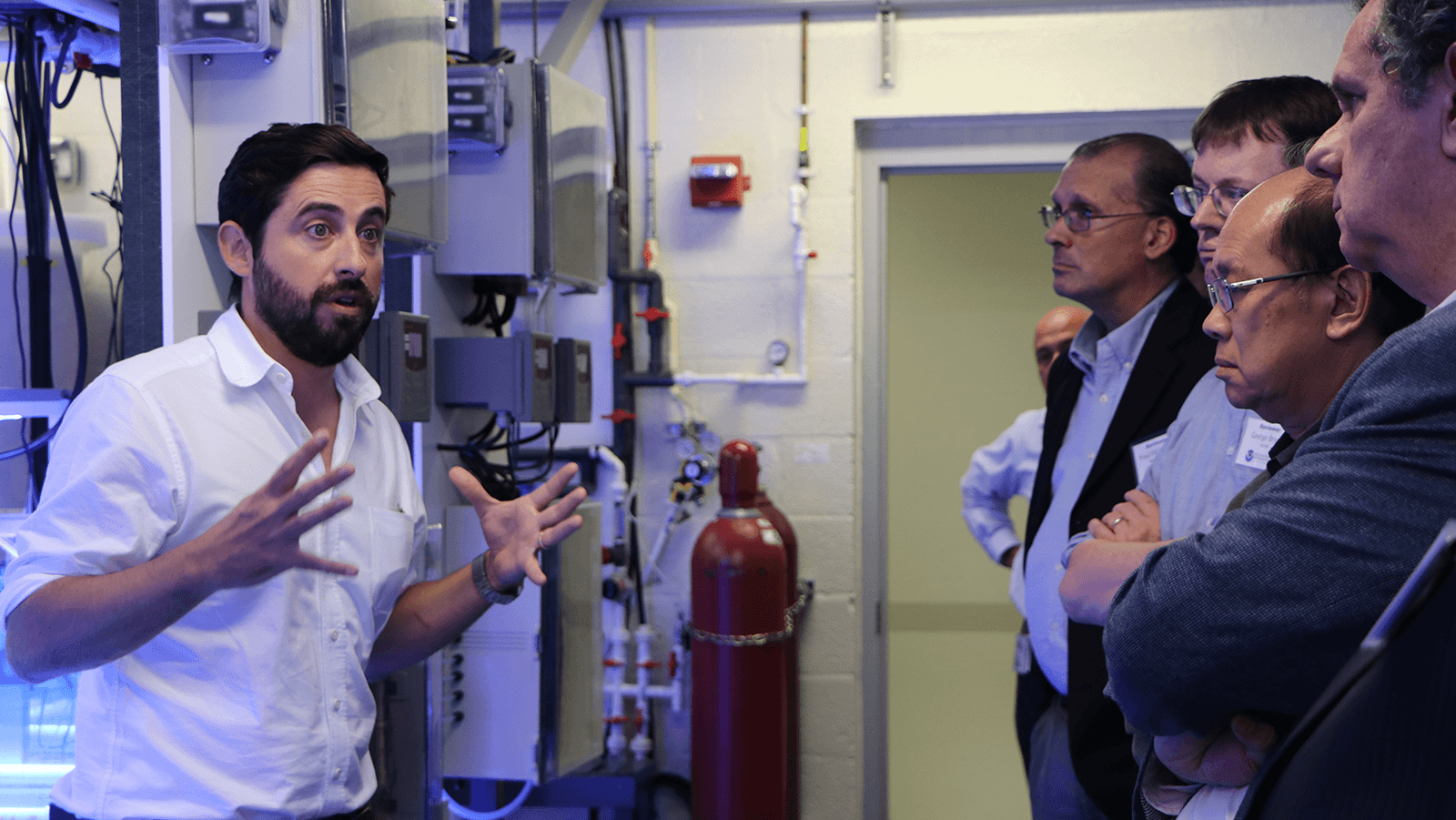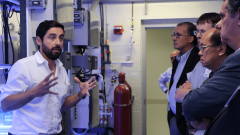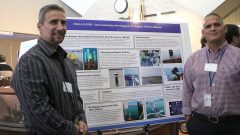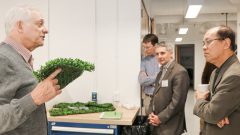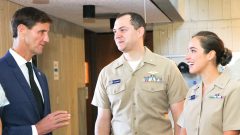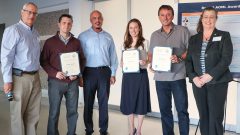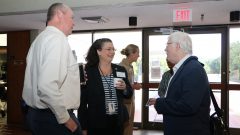November 19 – 21, 2019, AOML hosted a three day external review to evaluate the quality, performance, and relevance of our research portfolio. NOAA’s Office of Oceanic and Atmospheric Research conducts these reviews every five years to gauge the effectiveness of the research portfolios of all the labs, and also to forge new partnerships for research and collaborations across NOAA. Feedback received after the completion of the lab review will help set new priorities for AOML. The 2019 AOML review featured presentations from each science division, lightning talks from scientists, a poster session, lab tours, and an early career luncheon. We also had the pleasure of hosting Deputy NOAA Administrator Rear Admiral Tim Gallaudet at the opening of the review.
The review launched with an overview of AOML’s science and priorities by our new Director, John Cortinas, that included the premier of a video produced by AOML’s communication intern, Heidi VanBuskirk. OAR Deputy Assistant Administrator, Gary Matlock, presented a charge to reviewers which reinforced NOAA and OAR priorities. Climate Portfolio Steward Wayne Higgins then gave an introduction of OAR’s portfolio structure that underscored the importance of cross-collaboration between the labs.
Frank Marks opened the first science theme presentation by speaking about the science, divisional makeup, funding, partners and goals for the Hurricane Research Division. This overview was followed by a round of lightning presentations aimed at giving plain-language snapshots of the science being performed focusing on relevance, partners, and operational transitions of the science to support improved forecasts.
The reviewers were then escorted through a virtual day in the Hurricane Field Program. During this event, the division’s field program directors used video and animations to simulate a decision to deploy the NOAA hurricane hunter aircraft to improve forecasts and advance hurricane research. A discussion panel ended the morning which featured all the presenters, and was moderated by AOML Deputy Director, Molly Baringer for a deeper dive into the division’s portfolio, process, and challenges.
Image Captions
From Left:
1. Ian Enochs presenting in experimental reef lab. Photo Credit: NOAA AOML.
2. Ulises Rivero and Pedro Peña at poster session during 2019 lab review. Photo Credit: NOAA AOML.
3. Dr. Gustavo Goni explaining Sargassum project to reviewers. Photo Credit: NOAA AOML.
4. LCDR Andrew Colegrove and LTJG Alyssa Thompson Speaking with Deputy NOAA Administrator Rear Admiral Tim Gallaudet. Photo Credit: NOAA AOML.
5. Frank Marks, John Zawislak, John Cortinas, Lisa Bucci, Jason Dunion and Molly Baringer at AOML Awards Ceremony. Photo Credit: NOAA AOML.
6. Deputy Director Molly Baringer speaks with Ken Graham, Director of the National Hurricane Center and Gary Matlock, Deputy Assistant Administrator for Science. Photo Credit: NOAA AOML.
This format carried through the rest of the review. In the afternoon, AOML’s Physical Oceanography division had a chance to share their science and operations. Gustavo Goni led the presentations with an overview of the division and its major projects, followed by lightning presentations from scientists in the division. After clarifying questions, reviewers broke for a tour of the Physical Oceanography’s new engineering facility where they were able to see where the technology that helps improve hurricane forecasts, creates time-series of data, and monitors change in ocean currents is developed. The first day closed with a tour of the state-of-the-art experimental reef lab at the University of Miami and an AOML awards ceremony at SALT bistro.
The second day began with a recap from AOML Deputy Director, Molly Baringer. The Ocean Chemistry and Ecosystems Divisions Director, Jim Hendee, then began the divisional presentations with an overview of the accomplishments of the division, the science being performed, and the scientists who are leading those efforts. After the lightning round from Ocean Chemistry and Ecosystems, the reviewers broke for a tour of the labs housed at AOML where scientists showcased technology and instrumentation supporting ocean carbon monitoring, environmental sampling, and ‘omics analysis, the AOML fleet of small research vessels, and planned updates that will improve their capabilities. LCDR Andrew Colegrove closed the morning session with a presentation on the challenges of maintaining a near 50-year old facility and plans for the facility upgrades.
At lunch, the reviewers engaged with early career employees at AOML, followed by listening sessions with AOML stakeholders who provided feedback on their interactions with AOML scientists and leadership. In the afternoon, all divisions came together to deliver a poster session and then we heard from the University of Miami’s Cooperative Institute for Marine and Atmospheric Sciences with presentations by its director, Ben Kirtman and a UM economist, Renato Molina. Day three consisted of discussion between the reviewers and AOML leadership where the reviewers had a chance to address questions and provide initial feedback.
John Cortinas expressed his great appreciation to all employees for all their hard work to help AOML show our reviewers just how great of a lab we have here in Miami. RDML Tim Gallaudet’s attendance was appreciated by all and we were grateful to have him emphasize the importance of our science. We would like to thank our review panel for their time and attention as well as their anticipated feedback. The reviewers recommendations, recordings of the presentations, and copies of the presentations and supporting material will be posted on our lab review webpage as they become available.
